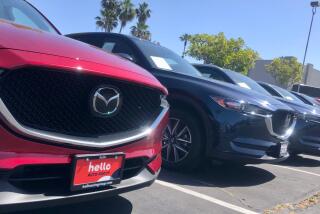Rollovers Led to Ford’s Tire Advice
A 1989 stability test, which predicted that the Ford Explorer with fully inflated tires could roll over when making sudden turns, was a key factor that prompted Ford Motor Co. to tell owners to inflate their tires significantly below their rated maximum, according to a company document and interviews.
Ford executives indicated last week that they were investigating whether its recommendation to put less air in the tires could be a contributing factor to the problems that led to the recall of the 6.5 million Firestone 15-inch ATX and Wilderness tires.
While Ford’s inflation recommendation has been known, the reasoning behind it was not.
An October 1989 Ford document detailing an analysis of the vehicle’s propensity to roll over showed the Explorer sport-utility vehicle would fail the tests when equipped with tires inflated to the maximum 35 pounds per square inch (psi). The document, obtained by the Washington Post, has been used in lawsuits against the auto maker.
While reducing the chance of a rollover, though, the lower pressure put the tires at a higher risk for overheating and failing.
Until now, Bridgestone/Firestone Inc.’s recent recall has focused scrutiny primarily on the sometimes catastrophic failure of tires that were under-inflated. The National Highway Traffic Safety Administration is investigating at least 64 deaths and more than 100 injuries linked to the tires.
Ford and Firestone officials said they were unaware of Firestone’s tire problems until recently and now are scrutinizing production processes at Firestone’s Decatur, Ill., plant, where the companies say most of the recalled tires were made.
The Chicago Tribune today quoted a former supervisor at the Decatur plant as saying that careful checks were not made at the plant due to a backlog of tires.
“There was no way all those tires could be inspected,” said Dayton Keyes, according to the Tribune.
Company spokesman Ken Fields told the media that each tire was thoroughly checked: “Each tire is inspected no matter what the backlog may be.”
The Tribune quoted several former employees as criticizing the manufacturing processes and inspection systems and as saying that quality was sacrificed for quantity.
*
Reuters contributed to this story.






